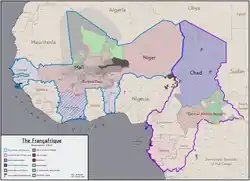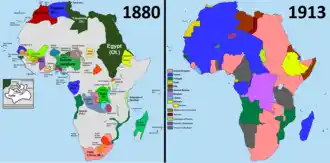
Françafrique is a term which is used to designate the manner in which France has retained influence across a large part of western Africa and the Sahel region where it was once the dominant European colonial power, even after the nations here acquired their independence in the late 1950s and 1960s. The term transliterates as ‘France’s backyard’. Elements of Françafrique include the manner in which France has been involved in the foreign policy decisions of many countries here, peace-keeping operations and has maintained military bases in many such countries. Similarly the French have retained strong economic ties to these parts of Africa and the currencies of many countries here were linked to both the French franc in decades gone by and are connected today to the Euro via French influence. The Françafrique influence of France has begun to decline in recent years, replaced by China economically and Russia militarily. Nevertheless, many theorists speculate that Françafrique continues to drive migration from many western African nations and the Sahel to Southern and Western Europe.[1]
Research your ancestors on MyHeritage
Françafrique chronology of eventsFrançafrique chronology of events

The empire which France amassed during the Age of Imperialism in the nineteenth century was second only to that of Britain. In 1830 an invasion of Algeria was launched, beginning French expansion in the Maghreb. The real era of mass colonization began during the reign of Emperor Napoleon III as the Second French Empire acquired control over vast territories in Africa, Indochina and in the Pacific Ocean. In Africa, while the British pursued a strategy of trying to acquire a continuous strip of colonies from Cairo in Egypt to Cape Town in South Africa, the French concentrated on dominating western Africa. They already had an enclave in Senegal since the seventeenth century and used this as an entrepôt for further expansion, while Algeria was used as a further point of expansion. By the time the First World War broke out in 1914 the French had acquired control over nearly all of West Africa and the Sahel, the major exceptions being what is now Nigeria, which was held by the British, a number of small coastal countries like Liberia, the British Gold Coast colony and German Togoland. These colonies would form the basis of the Françafrique of modern times.[2]

Like Britain, France was hugely weakened as a global power following the Second World War and had neither the will nor the resources to try and retain control over all of its colonial empire. It attempted to do so in Indochina and ended up mired in wars there until the Geneva Accords of 1954 brought the First Indochina War to an end, largely removing French influence from Vietnam, Cambodia and Laos. Humbled by this experience, chastened by the Suez Crisis of 1956 and facing an intense war to try and keep control over Algeria, a part of North Africa viewed by some as an intrinsic part of France, the French government under Charles de Gaulle moved to grant independence to the other African colonies in the late 1950s.[3]
Decolonization included the creation of the French Community, a Gallic version of the English Commonwealth set up to replace the short-lived French Union, which had categorically failed in Indochina. The French Community sought to establish a framework whereby France’s former colonies which were acquiring their independence from the late 1950s onwards would retain close cultural, economic and social ties with the former colonial power.[4] Although it only remained effective until the start of the 1960s, the French Community was the basis for the concept of Françafrique in the era of decolonization, the idea that the former colonies would remain aligned with France. A successor of sorts, the Organisation internationale de la Francophonie, which recognizes the ties of French-speaking former colonies to France, was established in 1970.[5]

Over the next several decades France continued to have a special relationship with the independent governments of many of the countries involved, while many of these countries continue to use French as the language of government and economic ties have remained extremely strong, often with French companies playing a central role in the colonies in a post-colonial manner. Perhaps the foremost element of Françafrique is the manner in which the countries involved remained tied to France via their currencies. The West African CFA Franc and the Central African CFA France, two currencies introduced by France to the colonies in 1945, remain in use to this day, albeit under significantly changed circumstances. These are tied to the French economic system.[6]
The countries in which Françafrique pertains, though to quite varying degrees, include Algeria, Benin, Burkina Faso, Burundi, Cameroon, the Central African Republic, Chad, the Republic of the Congo, Cote d’Ivoire, Gabon, Guinea, Madagascar, Mali, Morocco, Niger, Senegal, Togo and Tunisia. The concept of Françafrique and the extent to which these countries are tired economically to France has weakened over time, with the growth of Chinese influence in Africa and Russian military influence in the Sahel diminishing it in the early twenty-first century.[7]
Extent of migration caused by FrançafriqueExtent of migration caused by Françafrique
Françafrique is a generalized policy that has existed for over half a century, one which hasn’t led to explicit waves of migration. Nevertheless, it has continued to foster political, economic, social and cultural ties between France and many countries of western Africa and the Sahel. As such, many tens of thousands of people who have migrated from countries across West Africa since the late 1950s to France did so to a large extent based on Françafrique ties between France and its former colonies. Equally, because France has continued to have economic interests in a wide range of African countries, many French men and women have moved to head up and work for French companies in the Françafrique countries since decolonization occurred.[8]
Demographic impact of FrançafriqueDemographic impact of Françafrique
The demographic impact of Françafrique is equally difficult to assess with any precision, not just because of the inherent difficulties of assessing the policy’s impact on migration, but also because a law enshrined in France in 1978 prohibited the recording of people in the country along racial, ethnic and religious lines, meaning there are many demographic impediments to assessing the full demographic impact of Françafrique.[9] This aside, there are many tens of thousands of people living in France whose presence there is at least partially owing to the Françafrique. Similarly, many French people who have lived in West Africa and the Sahel since the 1960s have done so owing to the enduring ties between France and its former African colonies.
Research African ancestors in France on MyHeritageResearch African ancestors in France on MyHeritage
Research your ancestors on MyHeritage
See alsoSee also
Explore more about FrançafriqueExplore more about Françafrique
- France, Vital Records Index records collection on MyHeritage
- Filae Family Trees records collection on MyHeritage
- France, Births and Baptisms records collection on MyHeritage
- France, Church Baptisms and Civil Births records collection on MyHeritage
- France, Church Marriages and Civil Marriages records collection on MyHeritage
- France, Church Burials and Civil Deaths records collection on MyHeritage
- France, Deaths records collection on MyHeritage
- France, Newspapers and Periodicals records collection on MyHeritage
- Finding French Ancestors at Legacy Family Tree Webinars
- How to Trace Your French Ancestors with MyHeritage Resources at Legacy Family Tree Webinars
References
- ↑ Timothy Gibbs, ‘A French Neo-Colonialism?: The Controversial Concept of Françafrique’, in The English Historical Review, Vol. 139, No. 596 (February, 2024), pp. 193–214.
- ↑ https://www.oxfordreference.com/display/10.1093/acref/9780191737596.timeline.0001
- ↑ Andrew Smith, ‘Future imperfect: Colonial futures, contingencies and the end of the French Empire’, in Andrew Smith and Chris Jeppesen (eds.), Britain, France and the Decolonization of Africa (London, 2017), chapter 4.
- ↑ Benjamin Rivlin, ‘De Gaulle’s French Community’, in Current History, Vol. 36, No. 213 (May, 1959), pp. 278–283.
- ↑ https://onu.delegfrance.org/francophonie-8628
- ↑ https://blogs.lse.ac.uk/africaatlse/2017/07/12/the-cfa-franc-french-monetary-imperialism-in-africa/
- ↑ https://worldcrunch.com/world-affairs/russia-china-france-africa
- ↑ https://www.investmentmonitor.ai/features/french-colonial-fdi-africa-morocco-tunisia-cote-divoire/?cf-view
- ↑ https://www.ssi.ens.fr/textes/a78-17-text.html

